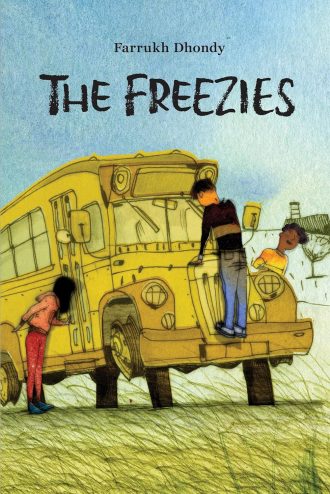The Freezies

Suleikha, Leo and Kai, a group of 12-year-olds known as “The Freezies,” befriend the intriguing Mr. Christaki, a traveller who camps with his converted bus on their village green. Exposed as an illegal immigrant from Syria, he goes on the run with a four-year-old girl. The Freezies come up with a risky and audacious scheme to reveal his desperate plight on national TV and manage to rescue him.
This rollicking, contemporary novel features three kids (two boys and a girl) in a small town in England, who connect with a vagrant music teacher and ultimately campaign to keep him from getting deported as an illegal immigrant.
There’s good writing…
From then on, we’d see Mr. Christaki at a distance painting his trailer and things. He padded about in his socks with holes. We could see his toes like new potatoes.
There’s even good poetry on occasion…
Think of a man
Far from home
Or a child that’s on the run
You say it’s nothing to do with you
But it’s something you have done
Birds fly where they want
Their ceiling is the sky
But men are owned by countries
No one can tell us why.
Think of lonely
People who
Are forced to run away
From poverty, hunger, cruelty
The dark clouds of the day.
And there are lots of ethnicities reflected among the characters. The chapters are written in first person, alternating between the three characters. The little village itself is charming and interesting, complete with a haunted house and eccentric woman deemed a witch.
A rival gang at school, the Hotshots, and a bigoted newspaper editor liven things up, although the gang rivalry seems to peter out early in the story. Issues like parents losing their jobs and villagers quick to think the worst of an accented man who appears in their midst, offer food for thought – social commentary between the lines.
The story’s main weakness is its plethora of adults, many of whom feel like main characters, thereby all but overshadowing the children’s roles. Where most middle-grade novels allow children to do heroic things with adults well in the background, this one often has the children relying on their parents’ connections and skills. It’s also unlikely and over-convenient that almost half the adults are former journalists, who help tie up loose ends all too handily in final pages. Further, far from offering a linear plotline, this story ambles into side stories (a school play, an allotment scandal) that have little to do with the main story and detract from the pacing.
But perhaps most objectionable is the climax – which revolves around a lie that the kids cook up to get television attention to save their teacher. Sure, the kids refer to all the guilt that goes with enacting their subterfuge, and continually weigh it as the lesser of evils, and emphasize the damage it does (as well as its overall positive effect). Even so, I personally found it a highly questionable strategy to promote, never mind entirely unrealistic in the way it achieves its goal. Even if it is middle-grade fiction.
All that said, it’s an entertaining read and the characters are well drawn and mostly worth traveling the length of the book with.
– Pam Withers

